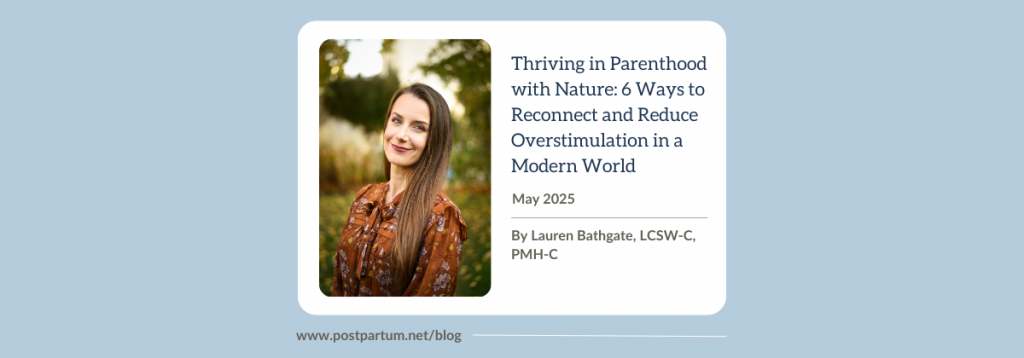By Lauren Bathgate, LCSW-C, PMH-C
Parenting in today’s fast-paced world can feel overwhelming. Between constant notifications, internet rabbit holes, and doomscrolling, new parents can easily feel overstimulated and disconnected. Nature offers a powerful antidote to overstimulation, supporting mental well-being and fostering deeper connections with your child.
The evidence supporting the benefits of nature to our physical health, mental health, and emotional well-being is vast. From reduced blood pressure and cortisol levels to improved emotional regulation, nature provides for us (American Psychological Association, 2020). Nature-based interventions can also significantly improve psychological well-being, particularly for mothers in the postnatal period (Siah et al., 2023).
Reconnecting with nature not only benefits us—it benefits the natural world, which needs our care, too. The more time we spend in nature, the more we strengthen our relationship with nature. We were wired this way as humans, and it’s time to get back to our roots.
During Times of Stress, Nature is a Co-Regulator
During times of stress, our nervous system craves co-regulation. In an overstimulating world, nature is a perfect co-regulator. The steadiness of the trees, the predictable rise and fall of the sun, and the rhythmic crash of ocean waves offer a sense of constancy when life feels unpredictable.
For parents, nature provides:
- A space to breathe. The simple act of stepping outside can shift the energy, break the cycle of overstimulation, and bring a moment of pause.
- A sensory reset. The feel of a breeze, the sound of birds, the scent of the earth after rain—these sensory experiences pull us out of our racing thoughts and into the present moment.
- An invitation to move. Whether it’s a slow walk or simply standing barefoot on the grass, movement in nature helps release stress stored in the body.
- A reminder of resilience. Seasons change, trees withstand storms, rivers carve new paths. Nature shows us that challenges come and go—and so do hard parenting moments.
Nature’s Wisdom: A Parenting Ally
Nature’s steady rhythms remind us that challenges are temporary—but how can we actively bring that steadiness into our daily lives as parents? Here are six practical ways nature is an ally for emotional balance and connection.
1. Reduce Stress and Overstimulation
- Nature activates the parasympathetic nervous system, lowering cortisol levels, improving mood, and promoting relaxation—essential for bonding with your baby. Research shows that just 20 minutes in nature can lower cortisol levels by 21% (Hunter et al., 2019).
- Tip: Practice grounding by standing barefoot on grass or soil, focusing on the sensations beneath your feet to release tension and counteract the effects of stress.
2. Enhance Emotional Regulation and Ease Parental Overwhelm
- Time in nature, like forest bathing, reduces rumination and negative thoughts, promoting calmness and emotional responsiveness—especially helpful for managing intense emotions like maternal rage. A 2015 study found that spending time in nature decreases activity in the prefrontal cortex associated with repetitive negative thinking (Bratman et al., 2015).
- Tip: Take a slow, mindful walk in a park or wooded area, paying attention to your senses to reset your emotional state. Imagine releasing anger with each exhale.
3. Improve Cognitive Function and Break the Doomscrolling Cycle
- Nature boosts attention, working memory, and problem-solving—key for navigating parenting challenges with more clarity and focus.
- Tip: Step outside to reflect or brainstorm when feeling stuck. Let the fresh air and open space clear your mind and interrupt the urge to doomscroll.
4. Build Social Connection and Reduce Isolation
- Natural environments encourage social interaction, reducing isolation and supporting emotional well-being—especially important for new parents.
- Tip: Join a local nature-based parent walking group or invite a friend for a walk to combine social time with outdoor benefits.
5. Boost Oxytocin Production for Stronger Bonding
- Time outdoors may stimulate oxytocin, the bonding hormone essential for breastfeeding and nurturing parent-infant relationships.
- Tip: Spend time outdoors with your baby, cuddling, playing, or simply relaxing together to enhance feelings of connection and calm.
6. Cultivate Mindfulness to Stay Present
- Nature inherently encourages mindfulness, helping parents stay present and attuned to their emotions and their baby’s cues.
- Tip: Practice sensory mindfulness outside—focus on one sense at a time (sights, sounds, smells) to ground yourself and stay present.
Reclaiming Time in Nature as a Parent
Many parents hesitate to prioritize time outside, feeling the weight of schedules, responsibilities, and the logistics of getting little ones out the door. But time in nature doesn’t have to be an elaborate escape. It can be as simple as:
- Drinking your morning coffee or tea on the porch instead of at the kitchen table.
- Taking deep breaths while watching the wind move through the trees.
- Saying yes to a short walk, even when it feels easier to stay inside.
- Letting the kids explore a patch of dirt while you soak in the sunshine.
Final Thoughts
Nature offers an accessible, powerful way to support your emotional well-being, reduce overstimulation, and strengthen your bond with your child. A few moments outside each day can make a big difference in how you feel and connect.
Ready to step into nature’s support? Take a breath, step outside, and let the natural world hold space for you. Your journey toward greater calm and connection begins with that first moment of fresh air.
References
American Psychological Association. (2020, April 1). Nurtured by nature. Monitor on Psychology, 51(3). https://www.apa.org/monitor/2020/04/nurtured-nature
Bratman, G. N., Hamilton, J. P., Hahn, K. S., Daily, G. C., & Gross, J. J. (2015). Nature experience reduces rumination and subgenual prefrontal cortex activation. Proceedings of the National Academy of Sciences, 112(28), 8567-8572.
Hunter, M. R., Gillespie, B. W., & Chen, S. Y. P. (2019). Urban nature experiences reduce stress in the context of daily life based on salivary biomarkers. Frontiers in Psychology, 10, 722.
Siah, C. J. R., Goh, Y. S., Lee, J., Poon, S. N., Ow Yong, J. Q. Y., & Tam, W. S. W. (2023). The effects of forest bathing on psychological well‐being: A systematic review and meta‐analysis. International Journal of Mental Health Nursing, 32(4), 1038-1054.
Perinatal Mental Health: Signs, Symptoms, and Treatment
Get Outside with The Climb
Get Help










